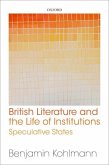However impossible or absurd this desire may be, it remains a fundamental source of both ethical responsibility and aesthetic pleasure.
Early modern English literature abounds with archaeological images, from open graves to ruined monasteries. Schwyzer demonstrates that archaeology can shed light on literary texts including works by Spenser, Shakespeare, and Donne. The book also explores the kinship between two disciplines distinguished by their intimacy with the traces of past life.
Hinweis: Dieser Artikel kann nur an eine deutsche Lieferadresse ausgeliefert werden.
Early modern English literature abounds with archaeological images, from open graves to ruined monasteries. Schwyzer demonstrates that archaeology can shed light on literary texts including works by Spenser, Shakespeare, and Donne. The book also explores the kinship between two disciplines distinguished by their intimacy with the traces of past life.
Hinweis: Dieser Artikel kann nur an eine deutsche Lieferadresse ausgeliefert werden.








